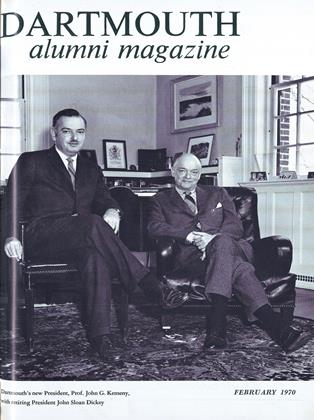JUDAISM DESPITE CHRISTIANITY. THE "LETTERS ON CHRISTIANITY AND JUDAISM" BETWEEN EUGEN ROSENSTOCK-HUESSY AND FRANZ ROSENZWEIG.
FEBRUARY 1970 EDWARD MARTIN POTOKER '53JUDAISM DESPITE CHRISTIANITY. THE "LETTERS ON CHRISTIANITY AND JUDAISM" BETWEEN EUGEN ROSENSTOCK-HUESSY AND FRANZ ROSENZWEIG. EDWARD MARTIN POTOKER '53 FEBRUARY 1970
Edited by Eugen Rosen-stock-Huessy. With an introduction byHarold Stahmer and two essays about thecorrespondence by Alexander Altmannand Dorothy M. Emmet. University ofAlabama Press, 1969. 198 pp. $7.
The small sheaf of letters on Christianity and Judaism exchanged during World War I between Eugen Rosenstock-Huessy, a Christian, and Franz Rosenzweig, a Jew who largely through the analytical writing of his Christian correspondent rediscovered his basic allegiance to Judaism, comprises only little more than half of this volume. The correspondence deals with such perennial matters as anti-Semitism, the Greek philosophers and Christianity, and the death of God controversy. At the same time it carries on a deadly serious dialogue on finding support for the life of the spirit in philosophy or philosophical method, on the one hand, or the then new theological revival being led by Karl Barth, on the other. We are told that the printed letters are only a small part of the correspondence and that the hope is eventually to print more. Until then, the essays which fill out the book must serve to illuminate it. Most useful in this regard, obviously, is the retrospective essay written fifty years after the correspondence by the surviving author, Rosenstock-Huessy. He attempts here to clear away some of the clotted nonsense that has become intertwined with some of the clearest thinking yet expressed in religious dialogue, thanks to the fact that the two writers first and foremost are systematic philosophers, who carry on their discussion within the framework of philosophy.
Though both recognized the importance of systematic philosophy (they were both steeped in Idealistic philosophy), it meant nothing to the solitary individual unless he could expose himself successfully to physical encounter, that is defend his attitudes at a profound- level. Franz Rosenzweig, at the beginning of the exchange, was ready to follow Rosenstock-Huessy, who became a Christian at sixteen, into the church. But reading and study pointed more and more to the basic tenet of "the One God beyond all our thinking and striving," and this ancient conception of Judaism became Rosenzweig's deepest conviction.
On the other hand, Rosenstock-Huessy's Christianity seems distinctly of the kind that grew out of the evolutionary concept - namely that Christianity was superior because it had evolved from Judaean and Hellenistic roots, and flourished in Graeco-Roman and Medieval cultures, absorbing the best and casting away the unneeded and unwanted. When Rosenstock-Huessy then began a letter: "Dear Fellow Jew + post- Christum natum + post-Hegel mortuum!" he offended Rosenzweig, who by this time had become convinced of his "Judaism in the first person."
The exact meaning of this "Judaism in the first person" is not worked out, but in-asmuch as Rosenzweig was, at the time of his untimely death, an active co-worker of Martin Buber, it would be interesting to know more about the mutual influences of the philosopher here with that of the "I-Thou" philosophy of Martin Buber. Perhaps later publications will bring this out. But the letters do show a successful opting for a viable modern Judaism in a liberally oriented Christian world.
Mr. Potoker is Assistant Professor of Englishand Comparative Literature, The BernardM. Baruch College of The City Universityof New York.
 View Full Issue
View Full Issue
More From This Issue
-
 Feature
FeatureFrom the Primate Patrimony To the Fellowship of Flowers
February 1970 By JAMES W. FERNANDEZ, -
 Feature
FeatureThe Pros and Cons of Coeducation
February 1970 -
 Feature
FeatureSpeaking of Books
February 1970 By FRANCIS BROWN '25, -
 Feature
FeaturePROF. JOHN G. KEMENY CHOSEN AS DARTMOUTH'S 13TH PRESIDENT
February 1970 -
 Article
ArticleThe Undergraduate Chair
February 1970 By WINTHROP A. ROCKWELL '70 -
 Class Notes
Class Notes1918
February 1970 By EDMUND H. BOOTH, DONALD L. BARR
Books
-
 Books
BooksTHE DEMOCRATIC VISTA: A Dialogue on Life and Letters in Contemporary America
JANUARY 1959 By GEORGE F. THERIAULT '33 -
 Books
BooksEDUCATION AND LIFE
January, 1931 By H. M. Dargan -
 Books
Books"MR. SECRETARY,"
June 1940 By Herrfrt W. Hill -
 Books
BooksThe Alchemist
OCTOBER, 1908 By Robert H. Ross '38 -
 Books
BooksThreading the Maze
June 1980 By Robert H. Ross ’38 -
 Books
BooksRANDOM ESSAYS ON MATHEMATICS, EDUCATION AND COMPUTERS.
NOVEMBER 1966 By ROBERT Z. NORMAN


